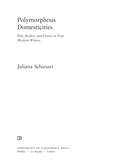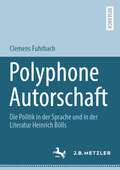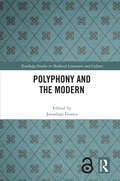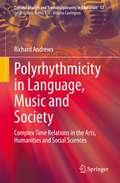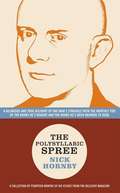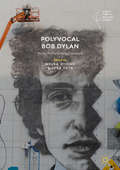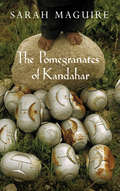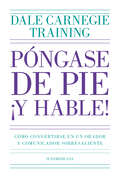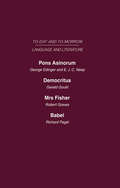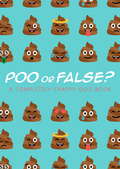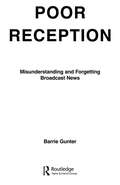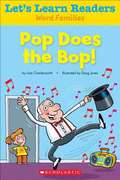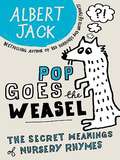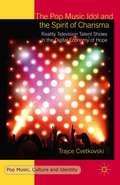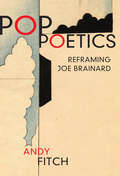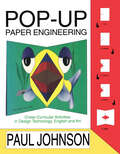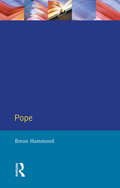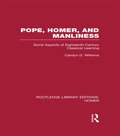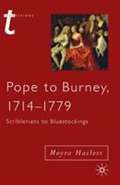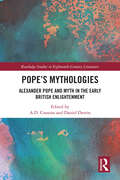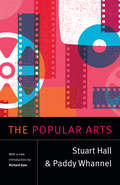- Table View
- List View
Polymorphous Domesticities
by Juliana SchiesariPolymorphous Domesticities maps out the play of gender, sexuality, and alternative forms of domesticity in the works of four modern European and American writers--Edith Wharton, Djuna Barnes, Colette, and J. R. Ackerley. What these four writers have in common is a defiance of patriarchal paradigms in their lives as well as in their works. Not only did they live outside the norms of the heterosexual family unit, they also pursued and wrote about alternative lifestyles that prominently involved animals. Through close readings from a feminist perspective, Juliana Schiesari reconfigures the ways in which interspecies relationships inflect domestic spheres, reading the "Other" through the lens of gender, home, and family. As she explores how domestic life is refigured by the presence of animals, Schiesari challenges anthropocentric frames of reference and brings the very definition of "human" into question.
Polyphone Autorschaft: Die Politik in der Sprache und in der Literatur Heinrich Bölls
by Clemens FuhrbachIn diesem Buch wird zunächst im Rückgriff auf die agonistische Demokratietheorie von Chantal Mouffe beschrieben, dass Sprache als politisches Bezugssystem funktioniert. Auf der Grundlage von Hannah Arendt und Jürgen Habermas wird dann eine Politik der Sprache entwickelt. Mit Bezug auf Seyla Benhabib wird eine kommunikative Ethik hergeleitet, die auf der methodischen Ebene an die dialogische Theorie und an die Polyphonie der Literatur nach Michail Bachtin angeschlossen wird. Das Modell der polyphonen Autorschaft wird schließlich auf die Böll-Forschung und auf die Werke des Autors Heinrich Böll angewendet.
Polyphony and the Modern
by Jonathan FruocoPolyphony and the Modern asks one fundamental question: what does it mean to be modern in one’s own time? To answer that question, this volume focuses on polyphony as an index of modernity. In The Principle of Hope, Ernst Bloch showed that each moment in time is potentially fractured: people living in the same country can effectively live in different centuries – some making their alliances with the past and others betting on the future – but all of them, at least technically, enclosed in the temporal moment. But can a claim of modernity also mean something more ambitious? Can an artist, by accident or design, escape the limits of his or her own time, and somehow precociously embody the outlook of a subsequent age? This book sees polyphony as a bridge providing a terminology and a stylistic practice by which the period barrier between Medieval and Early Modern can be breached.
Polyrhythmicity in Language, Music and Society: Complex Time Relations in the Arts, Humanities and Social Sciences (Cultural Studies and Transdisciplinarity in Education #12)
by Richard AndrewsThis book addresses the complex time relations that occur in some types of jazz and classical music, as well as in the novel, plays and poetry. It discusses these multiple levels of rhythm from a social science as well as an arts and humanities perspective. Building on his ground-breaking work in Re-framing Literacy, A Prosody of Free Verse and Multimodality, Poetry and Poetics, the author explores the world of multiple- or poly-rhythms in music, literature and the social sciences. He reveals that multi-layered rhythms are uncommon and little researched. Nevertheless, they are important to the experience of art and social situations, not least because they link physicality to feeling and to decision-making (timing), as well as to aesthetic experience. Whereas most poly-rhythmic relations are felt unconsciously, this book reveals the complex patterning that underpins the structures of feeling and of experience.
The Polysyllabic Spree
by Nick Hornby"Books are, let's face it, better than everything else," writes Nick Hornby in his "Stuff I've Been Reading" column in The Believer. "If we played cultural Fantasy Boxing League, and made books go 15 rounds in the ring against the best that any other art form had to offer, then books would win pretty much every time. Go on, try it. The Magic Flute v. Middlemarch? Middlemarch in six. The Last Supper v. Crime and Punishment? Fyodor on point. And every now and again you'd get a shock, because that happens in sport, so Back to the Future III might land a lucky punch on Rabbit, Run; but I'm still backing literature 29 times out of 30." This book collects Hornby's popular columns in a single volume with selected passages from the novels, biographies, collections of poetry, and comics under discussion.
Polyvocal Bob Dylan: Music, Performance, Literature (Palgrave Studies in Music and Literature)
by Nduka Otiono Josh TothPolyvocal Bob Dylan brings together an interdisciplinary range of scholarly voices to explore the cultural and aesthetic impact of Dylan’s musical and literary production. Significantly distinct in approach, each chapter draws attention to the function and implications of certain aspects of Dylan's work—his tendency to confuse, question, and subvert literary, musical, and performative traditions. Polyvocal Bob Dylan places Dylan’s textual and performative art within and against a larger context of cultural and literary studies. In doing so, it invites readers to reassess how Dylan’s Nobel Prize–winning work fits into and challenges traditional conceptions of literature.
The Pomegranates of Kandahar
by Sarah MaguireSarah Maguire's rich and lyrical poems have been highly praised for the ease with which they ground precise, sensual detail within the wider context of world events. In this remarkable new collection, her poems travel greater distances than ever before. The title poem laments the devastation visited upon Afghanistan following decades of war. Other poems consider the casualties of political unrest: would-be migrants in Tangiers gazing northwards at the longed-for phantasmagoria of 'Europe'; and packs of wolves on the loose in post-Soviet Kazakhstan. But there are intimate poems too, often using scientific vocabularies to offset a personal moment, as in 'Landscape, with Dead Sea' where the erosion of the poet's skin is connected to geological transformations at the earth's core.
Póngase de pie ¡y hable!: Cómo convertirse en un orador y comunicador sobresaliente
by Dale Carnegie TrainingUn libro con las herramientas necesarias para convertirse, velozmente, en un gran orador a través de las verdaderas claves para lograr que sus oyentes no se aburran, pero también para informarlos, persuadirlos e inspirarlos a la acción a través de su mensaje. Además, le enseñará a perder el miedo de hablar en público. De manera presencial o virtual, son cada vez más las instancias en las que tenemos que hablar en público, algo para lo cual no todo el mundo está preparado. Falta de experiencia, no saber qué decir, dudas sobre el tema a tratar y hasta pánico escénico son las dificultades más comunes de quienes se resisten a presentarse ante un auditorio. En este libro se ofrecen las herramientas necesarias para convertirse, en el menor tiempo posible, en un magnífico orador. Aprenderá a organizar una charla, ya se trate de una de cinco minutos frente a un grupo reducido o de otra de media hora ante un auditorio repleto. Descubrirá cuáles son las verdaderas claves para lograr que sus oyentes no se aburran, pero también para informarlos, persuadirlos e inspirarlos a la acción a través de su mensaje. Quizá lo más importante sea que Póngase de pie ¡y hable! le enseñará a perder definitivamente el miedo de hablar en público.
Pons Asinorum, or the Future of Nonsense Democritus or the Future of Laughter Mrs Fisher or the Future of Humour, Babel, or the Past, Present and Future of Human Speech: Today and Tomorrow Volume Twenty-Two
by Edinger, Gould, Graves, PagetPons Asinorum Or The Future of Nonsense George Edinger and E J C Neep Originally published in 1929. "A most entertaining essay, rich in quotation from the old masters of clownship’s craft." Saturday Review The author maintains that true nonsense must be aimless humour – the humour that makes fun as opposed to the humour that makes fun of something. 88pp Democritus Or The Future of Laughter Gerald Gould Originally published in 1929. "Democritus is bound to be among the favourites of the series. Gould’s humour glances at history, morality, and humanity…wise and witty writing." Observer Democritus is intended to illustrate the prevailing fashion in laughter and on the basis of historical and philosophical principles to forecast the humour of the future. 90pp Mrs Fisher Or The Future of Humour Robert Graves Originally published in 1928 "Mr Graves is the best man who could have been chosen to write on this subject." Daily Express "…perfectly irresponsible, as a joker should be." The Times This volume analyzes humour with a solemnity which becomes almost nightmarish. 90pp Babel Or the Past, Present and Future of Human Speech Richard Paget Originally published in 1930. "…stimulating and absorbing." Journal of Education This volume discusses human speech and treats it as a growth which must be tamed if it is to fulfil its highest purpose as a symbolism for human thought. 86pp
Ponteach, or the Savages of America
by Tiffany PotterPontiac, or Ponteach, was a Native American leader who made war upon the British in what became known as Pontiac's Rebellion (1763 to 1766). One of the earliest accounts of Pontiac is a play, written in 1766 by the famous frontier soldier Robert Rogers, of the Rangers. Ponteach, or the Savages of America is one of the only early dramatic works composed by an author with personal knowledge of the Indigenous nations of North America. Important both as a literary work and as a historical document, Ponteach interrogates eighteenth-century Europe's widespread ideological constructions of Indigenous peoples as either innocent and noble savages, or monstrous and violent Others.Presented for the first time in a fully annotated edition, Ponteach takes on questions of nationalism, religion, race, cultural identity, gender, and sexuality; the play offers a unique perspective on the Rebellion and on the emergence of Canadian and American identities. Tiffany Potter's edition is supplemented by an introduction that critically and contextually frames the play, as well as by important appendices, including Rogers' ethnographic accounts of the Great Lakes nations.
Poo or False?: A completely crappy quiz book, perfect for secret santa!
by HeadlineFirst there was HOW TO POO AT WORK, then there was 52 Things to Do While You Poo, and now there's POO OR FALSE? A cavalcade of crappy curiosities and fascinating faecal facts... in quiz form!Think you know your sh*t...? Which of these are 'true poos' and which are simply fake poos?King George III had an illness that turned his poo purpleIn 1938 a man called Boon Wallace was arrested for hurling turds off the Empire State BuildingNeil Armstrong dumped four bags of poo on the moonSloths only poo once a week, something scientists call 'the poo dance'The phrase 'do bears shit in the woods?' was invented by Charles DarwinThere is a road in the Northumberland town of Berwick-upon-Tweed called Poobum Lane Want to know the answers? Well stop stooling for time! Read on and prepare for some close encounters of the turd kind...'I'd give it five minutes if I were you.'- Florence Nightingale
Poor Reception: Misunderstanding and Forgetting Broadcast News (Routledge Communication Series)
by Barrie GunterPublished in 1990, Poor Reception is a valuable contribution to the field of Communication Studies.
Pop Does The Bop! (Word Family Readers)
by Liza CharlesworthPop Op loves to put on his top hat and do the bop! Watch Pop boogie in this lively tale that teaches lots and lots of -op words! Let's Learn Readers boost key literacy skills through engaging, easy-to-read stories. Share this super-fun book with your child to jumpstart phonics learning!
Pop Goes the Weasel: The Secret Meanings of Nursery Rhymes
by Albert JackFrom the international bestselling author of Red Herrings and White Elephants—a curious guide to the hidden histories of classic nursery rhymes.Who was Mary Quite Contrary, or Georgie Porgie? How could Hey Diddle Diddle offer an essential astronomy lesson? Do Jack and Jill actually represent the execution of Louis XVI and Marie Antoinette? And if Ring Around the Rosie isn’t about the plague, then what is it really about? This book is a quirky, curious, and sometimes sordid look at the truth behind popular nursery rhymes that uncovers the strange tales that inspired them—from Viking raids to political insurrection to smuggling slaves to freedom.Read Albert Jack's posts on the Penguin Blog.
The Pop Music Idol and the Spirit of Charisma: Reality Television Talent Shows in the Digital Economy of Hope (Pop Music, Culture and Identity)
by T. CvetkovskiThis book makes a case for the synergetic union between reality TV and the music industry. It delves into technological change in popular music, and the role of music reality TV and social media in the pop production process. It challenges the current scholarship which does not adequately distinguish the economic significance of these developments.
Pop Poetics
by Andy FitchAdopting artist-poet Joe Brainard as its principal focus, this project presents "Pop poetics" not as a minor, coterie movement meriting a sympathetic footnote in accounts of the postwar era's literary history, but as a missing link that confounds and potentially unites any number of supposedly rigid critical distinctions (authenticity versus formalism, the "personal" versus the mechanical). Pop poetics matter, argues Andrew Fitch, not just to the occasional aficionado of Brainard's I Remember, but to anybody concerned with reconstructing the dynamic aesthetic exchange between postwar art and poetry.
Pop Poetics
by Andy FitchAdopting artist-poet Joe Brainard as its principal focus, this project presents "Pop poetics" not as a minor, coterie movement meriting a sympathetic footnote in accounts of the postwar era's literary history, but as a missing link that confounds and potentially unites any number of supposedly rigid critical distinctions (authenticity versus formalism, the "personal" versus the mechanical). Pop poetics matter, argues Andrew Fitch, not just to the occasional aficionado of Brainard's I Remember, but to anybody concerned with reconstructing the dynamic aesthetic exchange between postwar art and poetry.
Pop Poetics
by Andy FitchAdopting artist-poet Joe Brainard as its principal focus, this project presents "Pop poetics" not as a minor, coterie movement meriting a sympathetic footnote in accounts of the postwar era's literary history, but as a missing link that confounds and potentially unites any number of supposedly rigid critical distinctions (authenticity versus formalism, the "personal" versus the mechanical). Pop poetics matter, argues Andrew Fitch, not just to the occasional aficionado of Brainard's I Remember, but to anybody concerned with reconstructing the dynamic aesthetic exchange between postwar art and poetry.
Pop! Pop! Pop!
by Kim Lee Cindy Peattie Monika FilipiTitle contained within StartUp Phonic Core Program. Not Sold Separately
Pop-Up Paper Projects: Step-by-step paper engineering for all ages
by Paul JohnsonThe techniques of creating pop-up forms are demonstrated in a series of practical lessons. The book also suggests ways in which pop-up forms can be used to enrich the study of English and art, and contains illustrations of childrens work.
Pope (Longman Critical Readers)
by Brean S. HammondThis collection of essays represents some of the best critical thinking on Pope in recent years. Professor Hammond examines the main issues in the debate, in particular why Pope's writing has been so resistant to modern methodologies, such as deconstruction.The essays focus on particular poems or themes and exemplify different theoretical perspectives, both traditional and modern. The editor's notes clarify the differences that exist, and what those differences can teach the student about theory in practice.
Pope, Homer, and Manliness: Some Aspects of Eighteenth Century Classical Learning (Routledge Library Editions: Homer)
by Carolyn D. WilliamsThe author here reassesses the concept of ‘masculinity’, and argues that it cannot be seen as an absolute standard, but only as the product of perpetual conflict between competing and unstable models. The argument is sustained by a close reading of the problematic conflict between gendered values in eighteenth-century classical learning. Pope’s Homer ensured the continuation of the tradition of using the Iliad and Odyssey to teach privileged boys how to become more ‘manly’. This book examines this pedagogy in its socio-literary context, and concludes that Pope’s Homer emerges as a relic of the struggle to preserve masculine dignity from the encroachments of feminine values in the text. This knowledge of classical and early modern literature has rarely been brought to bear on gender studies. First published in 1993, it remains a valuable contribution to debates concerning the reception of the Classical tradition.
Pope to Burney, 1714–1779
by Moyra HaslettThis essential guide defines literature of the eighteenth century as a literature written and received as public conversation. Moyra Haslett discusses and challenges conventional ways of reading the period, particularly in relation to notions of the public sphere. In her wide-ranging study, Haslett reads key texts - including The Dunciad, Gulliver's Travels and Pamela - in their literary and cultural contexts, and examines such genres as the periodical, the familiar letter, the verse epistle and the novel as textual equivalents of coterie culture.
Pope’s Mythologies: Alexander Pope and Myth in the Early British Enlightenment (Routledge Studies in Eighteenth-Century Literature)
by A. D. Cousins Daniel DerrinThis volume is the first to discuss the canon of Pope’s verse in relation to Early British Enlightenment thinking about mythology and mythography. Pope did not merely use classical (along with non-classical) mythology in his verse as a traditional, richly diverse medium through which to represent the diversity of private and civic life in his day, but he was an ambitious translator as well as refashioner of myth. It is a medium that he shapes anew and variously across all his major poems. This volume enhances appreciation of myth as a mode of apprehension as well as expression throughout Pope’s verse. In doing so it illuminates how, in early eighteenth-century Britain, understandings of what myth is and what it does were taking new directions – not least in response to Baconian thought and its legacy.
The Popular Arts (Stuart Hall: Selected Writings)
by Stuart Hall Paddy Whannel Richard DyerWhen it first appeared in 1964, Stuart Hall and Paddy Whannel's The Popular Arts opened up an almost unprecedented field of analysis and inquiry into contemporary popular culture. Counter to the prevailing views of the time, Hall and Whannel recognized popular culture's social importance and considered it worthy of serious study. In their analysis of everything from Westerns and the novels of Mickey Spillane, Ian Fleming, and Raymond Chandler to jazz, advertising, and the television industry, they were guided by the belief that studying popular culture demanded an ethical evaluation of the text and full attention to its properties. In so doing, they raised questions about the relation of culture to society and the politics of taste and judgment in ways that continue to shape cultural studies. Long out of print, this landmark text highlights the development of Hall's theoretical and methodological approach while adding a greater understanding of his work. This edition also includes a new introduction by Richard Dyer, who contextualizes The Popular Arts within the history of cultural studies and outlines its impact and enduring legacy.
